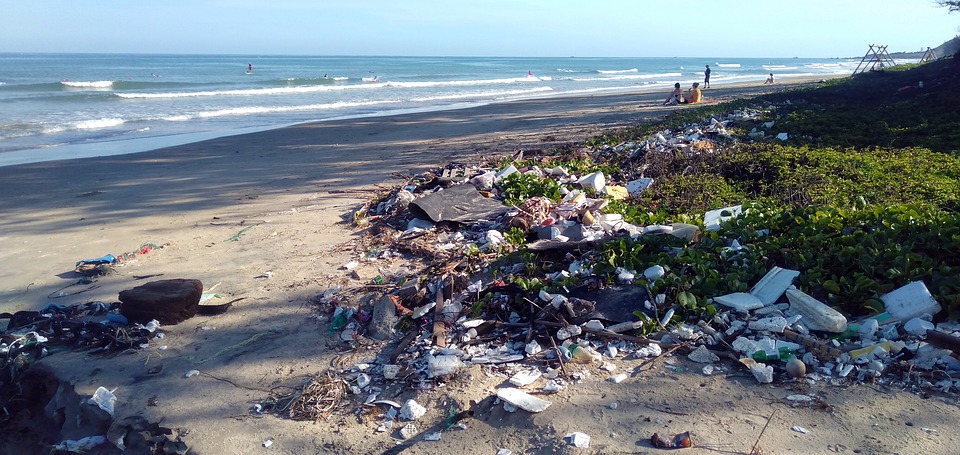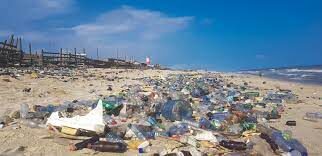Plastic has a variety of uses such as for clothing, bags, bottles, and utensils, and its production has been gradually increasing over the years. In fact, “According to the trade association PlasticsEurope, world plastic production grew from some 1.5 million tonnes (about 1.7 million tons) per year in 1950 to an estimated 275 million tonnes (303.1 million tons) by 2010 and 359 million tonnes (nearly 396 million tons) by 2018; between 4.8 million and 12.7 million tonnes (5.3 million and 14 million tons) are discarded into the oceans annually by countries with ocean coastlines” (Moore 2021). This unfortunately has had an adverse effect on the environment because plastics take many years to degrade and end up in various places of the environment from the deepest depths of the ocean to the polar regions. To put it into better words “The explosive production of affordable plastic goods during the 1950s ushered in an era of disposable living, fueled by an addiction to convenience and consumerism, that has created one of the world’s most vexing pollution problems” (Gross, 2021). It is difficult to really comprehend the extent to which plastics are harming the environment and the health of humans. What is extremely shocking is “Researchers are finding microplastics in the gut or tissue of nearly every living thing they examine, including the placentas of unborn children” (Gross 2021).

What is Gettysburg doing to make an impact and how can they improve?
Gettysburg college provides single-stream recycling opportunities for the entire campus, has installed 50 bottle refill stations, and departing students are able to donate reusable items for the Give It Up for Good Sale. This sale has prevented 420 tons of material from entering the waste stream (Sustainability at Gettysburg, 2021). There is also a charge for plastic bags at dining areas such as the Bullet Hole to reduce single-use plastics. Although Gettysburg has made significant strides trying to become more sustainable and have a positive impact there is still room for improvement.
There are several basic ways that students and faculty can participate in reducing plastic waste on campus. When I asked Gettysburg ecology professor Natasha Gownaris what the best ways to reduce plastics were, she said, “Reduce single-use plastics including plastic utensils and water bottles, make more sustainable seafood decisions, participate in things such as beach cleanups, and do your part by recycling.” Replacing plastic utensils would be a simple yet mindful decision and the fifty refillable water stations all over campus allow for easy access to water so purchasing it is not necessary.
Schools worldwide have started making significant changes on their campuses to reduce the amount of plastic that is used. One of those schools, Vanderbilt University, mentioned on their sustainability website that they will “eliminate all single-use plastic water and soda bottles in its operations throughout dining facilities, markets and vending machines.” (2021). This decision will save more than 430,000 water bottles per year. The school will be replacing the single-use plastics in their dining facilities with compostable materials. Vanderbilt is setting a great example and other schools should follow in their footsteps when it comes to reducing plastics.
Student Opinions Through Quiz
References
Gross, L., & Enck, J. (2021). Confronting plastic pollution to protect environmental and public health. PLoS Biology, 19(3), e3001131–. https://doi.org/10.1371/JOURNAL.PBIO.3001131
Moore, C. (2021, November 17). plastic pollution. Encyclopedia Britannica. https://www.britannica.com/science/plastic-pollution
Sustainability at Gettysburg. Sustainability at Gettysburg – Gettysburg.edu. (n.d.). Retrieved October 15, 2021, from https://www.gettysburg.edu/about-the-college/sustainability/.
Vanderbilt University. (1970, August 28). University eliminates single-use plastic water and soda bottles in operations on campus. Vanderbilt University. Retrieved October 15, 2021, from https://www.vanderbilt.edu/sustainability/2019/08/university-eliminates-single-use-plastic-water-and-soda-bottles-in-operations-on-campus/.
